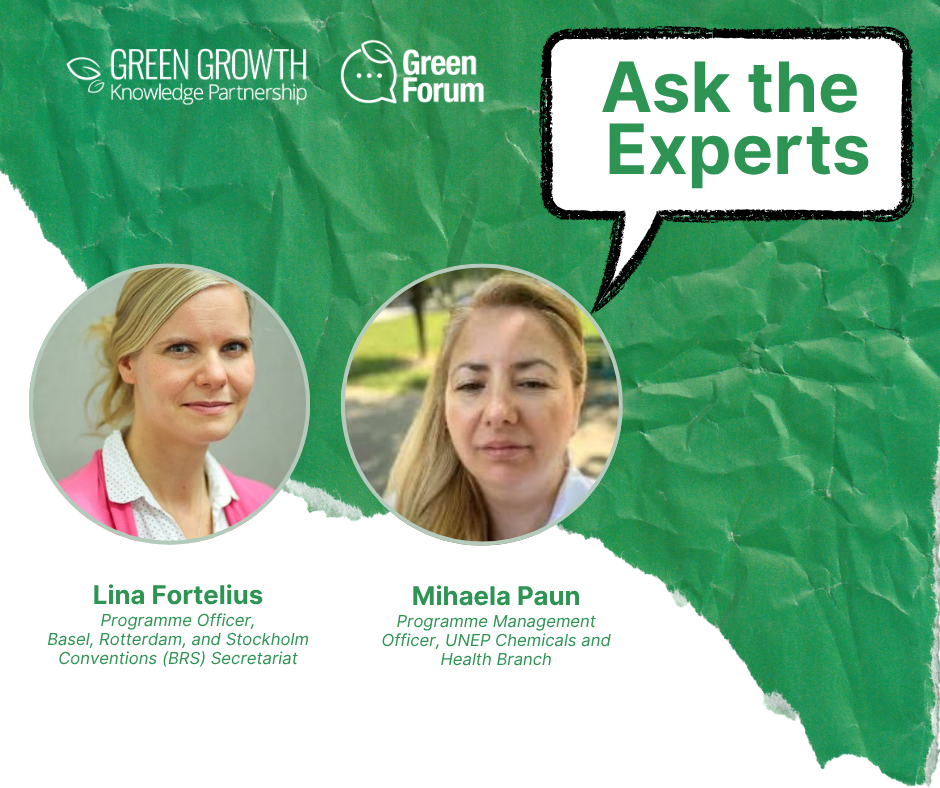This blog post was developed summarising the intervention of North Macedonia on the Global Green Growth Knowledge Partnership (GGKP) roundtable Inside the POPs Inventory: Lessons, Challenges and Successes from the Global NIP Update held on 14 April 2025.
North Macedonia is currently in the midst of a comprehensive update to its National Implementation Plan (NIP) for Persistent Organic Pollutants (POPs), aligning with the 2025 Global NIP Update framework and Stockholm Convention obligations. POPs inventory process is crucial for complying with Stockholm Convention obligations and strengthening the country’s systems for monitoring and managing POPs. For the NIP 2025, North Macedonia is updating the inventory of polybrominated diphenyl ethers (PBDE) and per- and polyfluoroalkyl substances (PFAS).
Stakeholder mapping and sectoral engagement
North Macedonia’s POPs inventory update process began with careful stakeholder mapping, identifying all relevant entities including:
- Governmental bodies (customs, environmental and health ministries, statistical office, internal affairs)
- Industries handling PBDE/PFAS-containing products (electronics, plastics, textiles, construction products, paper, etc.)
- Importers/exporters of PBDE/PFAS-containing products
- Waste management facilities, collective handlers and recyclers
- Academic and research institutions with expertise in POPs chemicals.
The team mapped 163 companies and national institutions, with meetings organised to present objectives, explain methodologies and gather input on sources, uses and management for PBDEs and PFAS. North Macedonia team used different communication channels for each group and developed tailored questionnaires, customising data collection tools for each stakeholder group to enhance accuracy and relevance.


Brief information and customised questionaries were distributed after the stakeholder meetings to gather specific product and chemical data, identify management practices and address knowledge gaps. The brief information sheets contain the goal of the project, brief information on which POPs chemicals have been used or are still being used in the sector and why, products containing POPs chemicals in the sector, main questions that will also be addressed in the questionnaire and contact information for the expert team.
Received answers from the questionnaires get through cross-checking and comparison of data from multiple sources (e.g., reports, databases, external surveys) for consistency and accuracy. Identifying discrepancies and patterns in the data is important to assess its reliability and relevance. Follow-up questionnaires or specific requests for data from relevant authorities can be planned to ensure the necessary information is gathered for further analysis if necessary.

Data collection and analysis
One of the key steps for North Macedonia’s POPs inventory was defining Chemical Abstracts Service (CAS) numbers for all relevant PBDE and PFAS compounds to ensure consistency in data collection. The team also identified products and waste streams containing these chemicals, covering electrical and electronic equipment, vehicles, textiles, furniture, insulation materials, and other products treated with flame retardants.
Following the latest Stockholm Convention guidance, the experts analysed import and export data using national customs records, MAKstat from State Statistical Office and UN Comtrade. A key contribution came from the Customs Office, which provided data for the list Harmonized System (HS) codes for all imported and exported products that contain POPs chemicals. This allowed cross-checking for the presence and flow of PBDE and PFAS-containing products in the country with greater accuracy.
It is important to select the most appropriate and reliable data source for POPs inventory among multiple sources. Different data sources were therefore selected for all 13 sectors covering both PBDEs and PFAS-containing products and waste. For import and export of products that may contain PBDE or PFAS, the data from the Customs Office is used. In regards of the data for generated waste, annual reports from Ministry of Environment and Physical Planning (MoEPP) were mostly used, with some data from State Statistical Office and Landfill Drisla.
And finally, material flow model is developed for each sector using these data. For example of the electrical and electronic equipment (EEE) and waste (WEEE) sector, import and export of EEE is presented in the first part, generated WEEE and where it is disposed in the second part, and the collection and treatment as well as export in the third part. It tracks imports and exports, generation and recycling for 11 years. This approach was replicated for all 13 sectors, with each data source carefully selected for reliability.
Challenges and gaps
Despite these efforts, several challenges persist. First of all, there is no legal obligation for companies to collect or report data on POPs or POPs-containing products and waste, leading to gaps and inconsistencies. Awareness of PBDEs and PFAS remains limited among companies, and coordination within companies (between procurement, sales, and environmental departments) is often weak. Limited number of people engaged in production companies makes the data collection more time-consuming.
In-country testing capabilities for POPs are also lacking, with difficulty identifying POPs in complex products. Some data are incomplete or inconsistent for longer periods (more than 10 years), and lack of comprehensive data on waste flows exists. Some datasets are missing particularly for textile and carpet waste, as well as detailed assessments of illegal landfills.
North Macedonia’s POPs inventory update is a testament to the power of structured stakeholder engagement, sectoral analysis and persistent data gathering. By building on reliable sources and international guidance, the country is working to overcome institutional and technical gaps, laying the groundwork for a more effective and compliant POPs inventory system.
The process is ongoing, and while challenges remain, the collaborative approach and commitment to data-driven decision-making are setting a strong foundation for the future of POPs management in North Macedonia.
This blog post was developed drawing on insights from the Global Green Growth Knowledge Partnership (GGKP) roundtable Inside the POPs Inventory: Lessons, Challenges and Successes from the Global NIP Update held on 14 April 2025. As part of the Global NIP Update project (GEF ID 10785), funded by the Global Environment Facility (GEF) and led by UNEP, this roundtable brought together nine countries currently engaged in reviewing and updating their National Implementation Plans (NIPs) under the Stockholm Convention to foster peer learning on the development of POPs inventories.
To learn more about the Global NIP Update project, visit Global NIP Update | Green Policy Platform
For a deeper dive into the GGKP roundtable on POPs inventory, you can access the full recordings and materials here: Inside the POPs Inventory: Lessons, Challenges and Successes from the Global NIP Update
Authors:
 |
Ms. Slavjanka Pejchinovska–Andonova, Environmental Consultant & National Expert on New Industrial POPs (EcoMosaic) |
 |
Ms. Soomin Bae, Knowledge Management Support Consultant (GGKP, GGGI)
|



